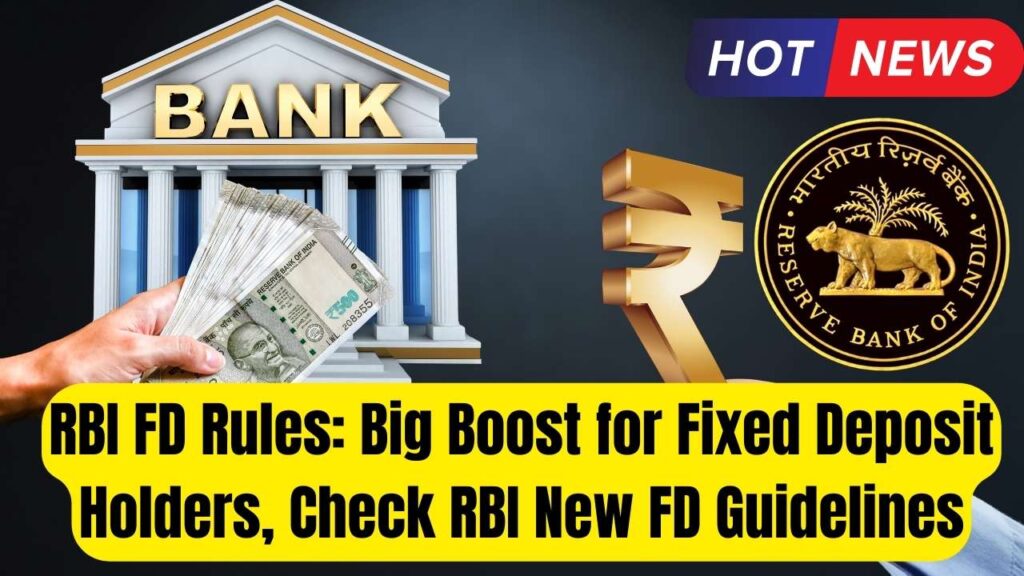RBI FD Rules – Fixed Deposits (FDs) have always been one of the safest investment options for risk-averse individuals. To enhance depositor convenience and financial security, the Reserve Bank of India (RBI) has introduced new FD guidelines effective from January 1, 2025. These changes are designed to improve fund accessibility, premature withdrawal flexibility, and nomination facilities.

Understanding these new RBI FD rules is crucial for both existing and new deposit holders. Let’s break down these updates, their impact, and how you can benefit from them.
RBI FD Rules
| Feature | New Rule | Impact on Depositors |
|---|---|---|
| Premature Withdrawal (Below ₹10,000 FDs) | Allowed within 3 months, but no interest is paid. | Offers liquidity for small deposits. |
| Critical Illness Premature Withdrawal | Full withdrawal allowed for medical emergencies, but no interest. | Eases financial burden during medical crises. |
| Large FD Withdrawals (Above ₹10,000) | 50% of deposit can be withdrawn, up to ₹5 lakh within 3 months. | Improved accessibility to emergency funds. |
| Maturity Notification | NBFCs must notify depositors 14 days before maturity instead of 2 months. | Ensures better awareness for reinvestment decisions. |
| Mandatory Nomination | All accounts must have a nominee. | Smooth legal transition of funds to heirs. |
| Insurance Coverage | RBI suggests banks offer optional FD insurance schemes. | Enhances security for depositors. |
| Official Source | RBI Official Website | Reliable reference for official guidelines. |
RBI’s new FD rules offer greater flexibility, security, and financial planning opportunities for deposit holders. With easier premature withdrawal, timely maturity notifications, mandatory nomination, and optional FD insurance, depositors can better manage their finances while ensuring hassle-free fund access for their families.
Understanding RBI’s New FD Guidelines
1. Premature Withdrawal Rules: More Flexibility for Depositors
One of the most significant updates in RBI’s FD regulations is the revised premature withdrawal policy:
- For deposits below ₹10,000: Depositors can withdraw funds within 3 months, but they will not receive any interest.
- For critical illness cases: Full withdrawal is allowed within three months, with the principal amount refunded but without accrued interest.
- For deposits exceeding ₹10,000: Deposit holders can withdraw up to 50% of the principal amount (maximum ₹5 lakh) within three months, but without interest.
Example: If you have an FD of ₹50,000, you can withdraw up to ₹25,000 in the first three months, but no interest will be paid on the withdrawn amount.
2. Timely Maturity Notifications for Better Financial Planning
To help depositors make informed financial decisions, NBFCs must now notify FD holders at least 14 days before maturity (reduced from 2 months).
Why this matters: This change ensures that depositors can plan whether to renew, withdraw, or reinvest their deposits without missing deadlines.
3. Mandatory Nomination Facility for All FD Holders
To reduce legal hassles in case of the depositor’s demise, RBI now mandates all banks and NBFCs to ensure that FD accounts have a nominee.
Benefits of Nomination:
- Ensures smooth transfer of funds to the rightful heir.
- Prevents legal disputes over unclaimed deposits.
- Saves families from complicated paperwork during tough times.
4. Introduction of Optional FD Insurance
RBI is encouraging banks to offer optional FD insurance schemes, similar to Deposit Insurance and Credit Guarantee Corporation (DICGC) coverage, which currently insures bank deposits up to ₹5 lakh.
Why this matters:
- Deposit holders will have the option to insure their FDs beyond ₹5 lakh, enhancing security.
- This will provide additional financial protection in case of bank failures or crises.
5. Tax Implications and TDS on FDs
- The Tax Deducted at Source (TDS) on FD interest remains at 10% if PAN is provided and 20% if PAN is not linked.
- Interest earned from FDs above ₹40,000 (₹50,000 for senior citizens) in a financial year is taxable.
Tip: Submit Form 15G or 15H if your total income is below the taxable limit to avoid TDS deductions.
How These Rules Impact FD Holders?
For Senior Citizens & Retirees:
- Greater liquidity for small deposits ensures quick access to cash during emergencies.
- Mandatory nomination ensures that heirs receive funds smoothly.
- Optional FD insurance adds an extra layer of protection.
For Working Professionals:
- Timely maturity notifications help in better financial planning.
- Premature withdrawal options give flexibility in case of unexpected expenses.
- Awareness of TDS deductions helps in tax savings.
For Businesses & NRIs:
- Businesses can benefit from withdrawal flexibility for managing cash flow.
- NRIs must ensure nominees are updated to avoid fund transfer issues in case of unforeseen circumstances.
IDBI Bank JAM DV & Interview Call Letter 2025 Out – Check Your Schedule!
RBI Penalizes Equitas Small Finance Bank & India Post Payments Bank – Here’s Why!
RBI to Announce Monetary Policy Today – Check Time & Live Streaming Details!
FAQs
1. Can I withdraw my FD before 3 months under the new RBI rules?
Yes, but only if the deposit is below ₹10,000 or for critical illness cases. In both cases, no interest will be paid.
2. What happens if I don’t add a nominee to my FD?
Your legal heirs may face delays and legal formalities to claim the amount after your demise.
3. Are these rules applicable to all banks?
Yes, these guidelines apply to all commercial banks and NBFCs regulated by RBI.
4. Can I withdraw ₹1 lakh from a ₹10 lakh FD within three months?
No, the withdrawal is limited to 50% of the deposit, up to a maximum of ₹5 lakh within the first three months.
5. Does RBI provide insurance for FDs?
RBI has suggested that banks offer optional FD insurance schemes, but depositors should check with their bank for availability.
6. How do I check my FD maturity date?
Your bank or NBFC is required to notify you 14 days before maturity under the new guidelines.







